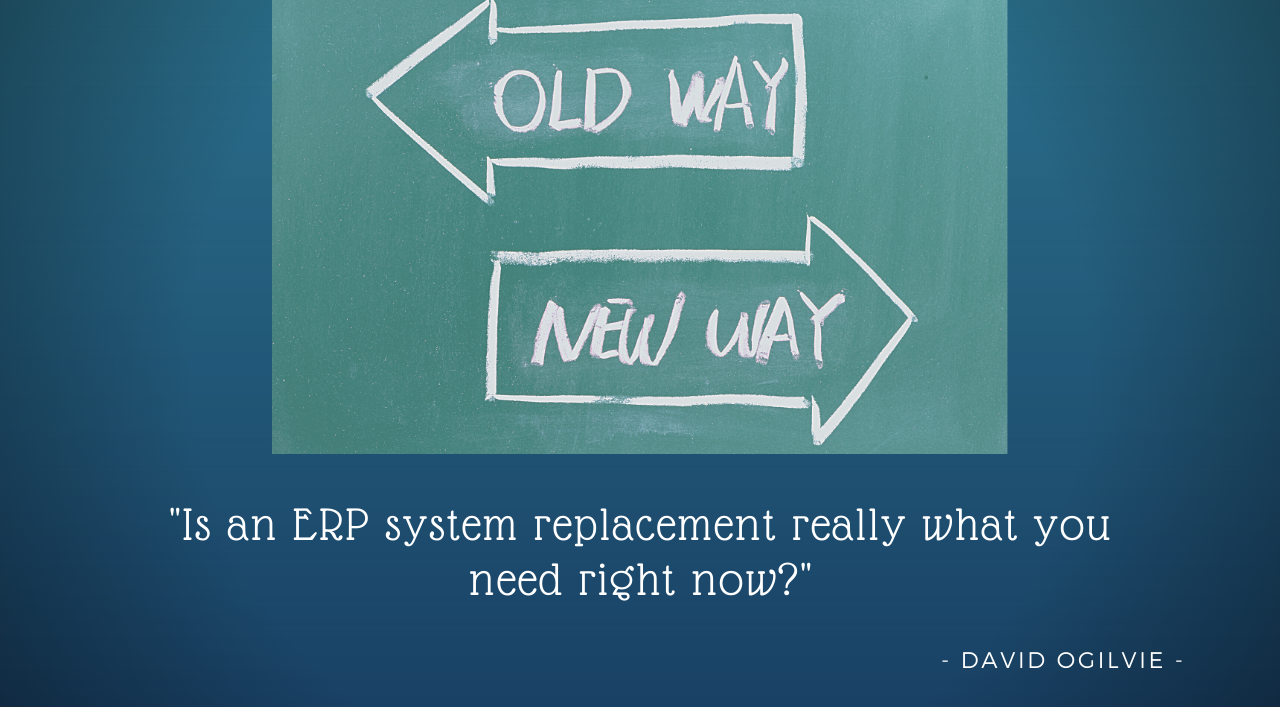
Do you need to replace – or renovate?
Happy New Year to everyone. I sincerely hope you all had a great holiday period and relaxed enough to start this year off on a good footing.
The new year allows us to reflect on past events and practices. It’s common for many of us to set new goals, make resolutions, and change habits.
I know for myself that it is often habits that need tweaking rather than inventing new ones and replacing old ones. Yes, there are times that call for something new, but I believe that shouldn’t be your default position.
So it is with ERP systems. Over the past three years, since COVID hit, there has been a massive increase in the number of executives looking to replace their ERP systems. It has been good business for the ERP vendors, their partner networks, and associated companies. I know because many of my clients have asked me to help them on that journey.
But why change? Why do you need to embark on this replacement journey?
Many of my clients initially reached out to me, asking for assistance selecting a new ERP system, only for us to find, after some initial “why” and “what” questioning, they didn’t need to replace the system. The product could do most of what they needed. They simply needed to learn how to better use the system they had.
It has been common when we open that discussion to find the people who are in the business today are a completely different cohort from those who implemented the system initially. One person has simply taught many people, “This is how you do this in this system”. In reality, when you understand the product at a deeper level, there are often many different ways to achieve an outcome. It may require some tweaking of the configuration, but it is possible.
So why do so many preach about digital transformation? A transformation is defined as:
“a marked change in form, nature, or appearance.”
Does your business ‘really’ need a marked change in form or nature? Marked changes to a business are normally accompanied by marked ‘change management’ issues. In these times when almost every economist is predicting a major recession or at least a significant downturn, why would you want to add the additional risk of a significant change event adding to the challenges you have to already manage?
I firmly believe that in many cases, a ‘restoration of your existing system’ is a better use of your hard-earned profit and at significantly lower risk and cost than a selection and implementation of a new one.
But when you do start your new selection process, a common refrain from various consulting firms is, “Download our vendor guide”. Seriously, why not conduct your own Google search and avoid being added to a mailing list?
So, my advice is to be wary of firms espousing things like:
- “Streamline the way you do business with the right ERP system.”
- “Looking for a [insert your business type, mining/distribution/manufacturing] solution to solve your business problems?”
- “What are the best ERP solutions for your [insert your business size, enterprise, mid-tier, small] business?”
- “Let’s digitise your future.”
- “Let us get you on the digital transformation journey.”
These guys assume you need something new, and there is no focus on how you might be able to tweak your existing investments.
All these statements are from recent advertisements by various consulting firms that encourage you to reach out and get help changing your ERP system.
There is an assumption in them all that there is something wrong with your existing system. What exactly isn’t working for you? Do you understand exactly what business problems a new system will solve that the old one won’t? Especially when you consider that many of those products on the market today have the same code executing in the background as earlier versions; they simply have a different user interface. So where is the business benefit? It has often been the case in past projects that supply chain resiliency – which I often write about – is achieved through these projects.
This is why I have developed an approach called “ERP Renovation”. The aim is to renovate your system so it is shiny and new and working for you. It forms part of my “PSI model” for a company’s ERP journey.
If you want a better outcome at a significantly lower risk and cost, reach out to me by following this link for a virtual coffee and a conversation, where we can establish your real needs and desired outcomes and potentially devise a way forward for you. Let’s not immediately jump to the costly and risky replacement option.